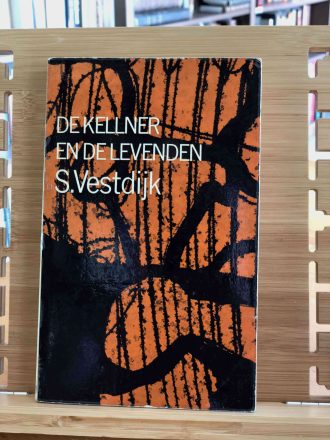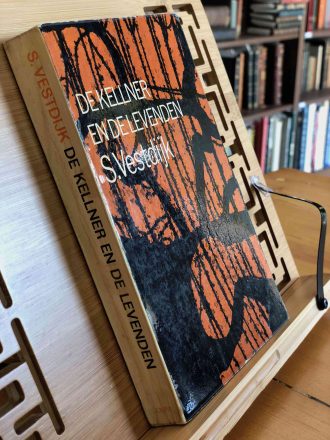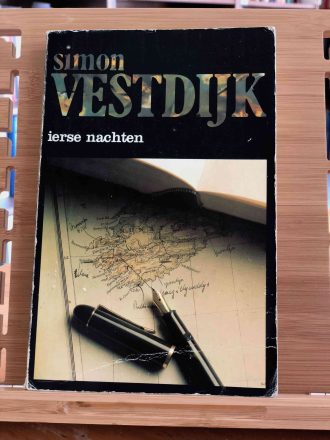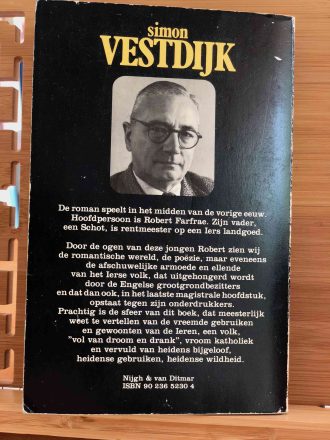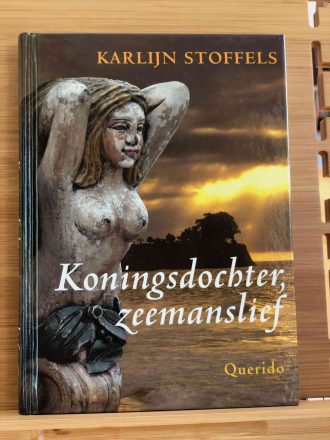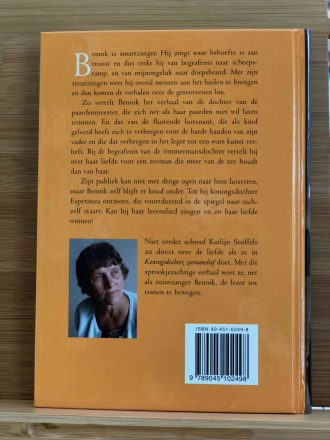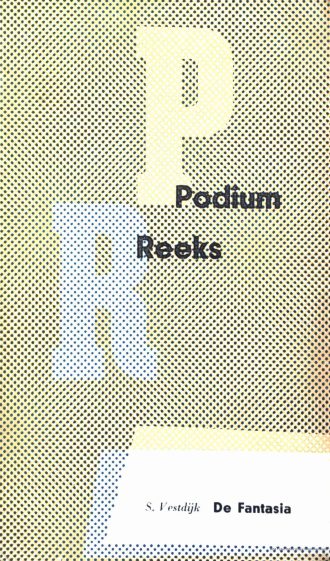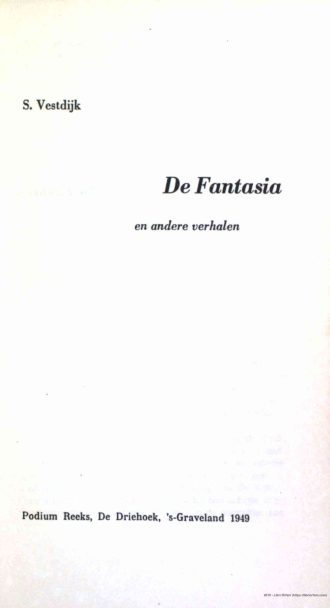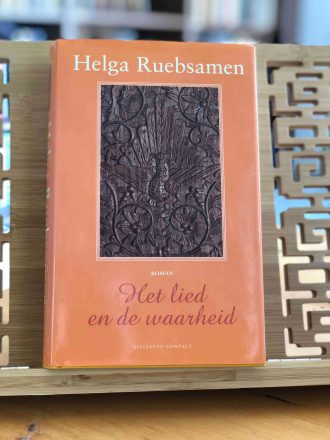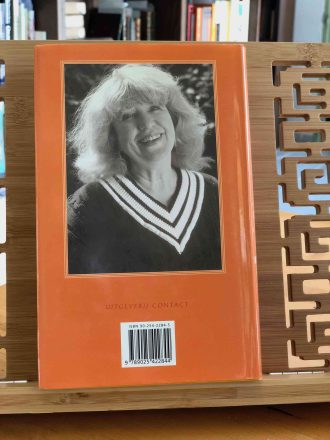Nederlands:
De leugen is onze moeder van Simon Vestdijk, gepubliceerd in 1965 door Bert Bakker / Daamen, is een verzameling essays die verschillende intellectuele en culturele onderwerpen verkent. Het boek bevat 239 pagina’s, met afmetingen van 13,5 cm x 20 cm, en is gebonden in een softcover met een perfecte binding.
In De leugen is onze moeder onderzoekt Vestdijk de thema’s van filosofie, psychologie, beeldende kunst en literatuur. De titel van het boek, “De leugen is onze moeder,” weerspiegelt zijn overtuiging dat illusie en zelfbedrog inherent zijn aan de menselijke conditie. Vestdijk bespreekt hoe deze concepten zich manifesteren in verschillende aspecten van het leven en de cultuur. Hij stelt dat leugens en zelfbedrog noodzakelijk zijn voor het behoud van mentale en emotionele stabiliteit, en dat deze leugens vaak de basis vormen van onze kunst, wetenschap en relaties.
Vestdijk analyseert in een reeks diepgaande essays de rol van leugen en waarheid in de filosofie, waarbij hij de ideeën van grote denkers als Nietzsche, Freud en Sartre bespreekt. Hij verkent hoe filosofische systemen vaak gebaseerd zijn op bepaalde aannames en leugens die hun geloofwaardigheid ondersteunen. In zijn essays over psychologie onderzoekt hij de mechanismen van zelfbedrog en de manieren waarop mensen zichzelf overtuigen van bepaalde waarheden om hun eigen bestaan betekenis te geven.
Op het gebied van beeldende kunst bespreekt Vestdijk hoe kunstenaars leugens gebruiken om diepere waarheden te onthullen. Hij onderzoekt hoe kunst een reflectie is van de menselijke geest en hoe het de kijker dwingt om zijn eigen percepties en overtuigingen in twijfel te trekken. Vestdijk’s essays over literatuur analyseren hoe schrijvers fictie gebruiken om de complexiteit van de menselijke ervaring uit te drukken en om lezers te confronteren met hun eigen vooroordelen en zelfbedrog.
Zijn schrijfstijl in deze essays is scherpzinnig en provocerend, met een vleugje ironie. Vestdijk daagt zijn lezers uit om verder te kijken dan de oppervlakte van conventionele waarheden en om de rol van leugen en illusie in hun eigen leven te erkennen. Zijn essays zijn rijk aan intellectuele inzichten en nodigen uit tot reflectie op de diepere lagen van menselijke interactie en perceptie.
Simon Vestdijk (1898-1971) was een van de meest productieve en invloedrijke Nederlandse schrijvers van de 20e eeuw. Vestdijk werd geboren in Harlingen en begon zijn carrière als arts, maar wendde zich al snel tot de literatuur. Hij schreef meer dan 50 romans, talloze essays en poëzie, en zijn werk beslaat een breed scala aan genres en onderwerpen, van historische romans tot psychologische drama’s. Vestdijk stond bekend om zijn intellectuele benadering en zijn vermogen om complexe ideeën op een toegankelijke manier te verwoorden. Zijn werk werd gekenmerkt door een diepgaande exploratie van menselijke emoties en de filosofische en psychologische krachten die het gedrag sturen. Hij ontving talrijke prijzen voor zijn werk, waaronder de P.C. Hooftprijs en de Constantijn Huygensprijs, en blijft een centrale figuur in de Nederlandse literatuur.
English:
De leugen is onze moeder (The Lie is Our Mother) by Simon Vestdijk, published in 1965 by Bert Bakker / Daamen, is a collection of essays exploring various intellectual and cultural subjects. The book consists of 239 pages, measuring 13.5 cm x 20 cm, and is bound in a softcover with perfect binding.
In De leugen is onze moeder, Vestdijk examines themes of philosophy, psychology, visual arts, and literature. The title, “The Lie is Our Mother,” reflects his belief that illusion and self-deception are inherent to the human condition. Vestdijk discusses how these concepts manifest in various aspects of life and culture, arguing that lies and self-deception are essential for maintaining mental and emotional stability, often forming the basis of our art, science, and relationships.
Vestdijk’s essays delve into the role of lie and truth in philosophy, discussing the ideas of prominent thinkers like Nietzsche, Freud, and Sartre. He explores how philosophical systems are often built on certain assumptions and lies that underpin their credibility. In his essays on psychology, he examines the mechanisms of self-deception and the ways people convince themselves of certain truths to give their existence meaning.
In the realm of visual arts, Vestdijk discusses how artists use lies to reveal deeper truths. He examines how art reflects the human mind and compels viewers to question their own perceptions and beliefs. His essays on literature analyze how writers use fiction to express the complexity of the human experience and confront readers with their own biases and self-deception.
Vestdijk’s writing style in these essays is insightful and provocative, with a touch of irony. He challenges readers to look beyond the surface of conventional truths and to acknowledge the role of lie and illusion in their own lives. His essays are rich in intellectual insights and invite reflection on the deeper layers of human interaction and perception.
Simon Vestdijk (1898-1971) was one of the most prolific and influential Dutch writers of the 20th century. Born in Harlingen, Vestdijk began his career as a physician but soon turned to literature. He wrote over 50 novels, numerous essays, and poetry, and his work spans a wide range of genres and subjects, from historical novels to psychological dramas. Vestdijk was known for his intellectual approach and his ability to articulate complex ideas in an accessible manner. His work is characterized by a profound exploration of human emotions and the philosophical and psychological forces that drive behavior. He received numerous awards for his work, including the P.C. Hooft Prize and the Constantijn Huygens Prize, and remains a central figure in Dutch literature.








